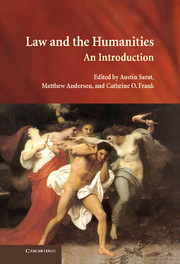Book contents
- Frontmatter
- Contents
- Contributors
- Acknowledgments
- Introduction: On the Origins and Prospects of the Humanistic Study of Law
- I PERSPECTIVES ON THE HISTORY AND SIGNIFICANCE OF SCHOLARSHIP IN LAW AND THE HUMANITIES: THREE VIEWS
- II IDEAS OF JUSTICE
- III IMAGINING THE LAW
- IV LINGUISTIC, LITERARY, AND CULTURAL PROCESSES IN LAW
- 12 Language
- 13 Interpretation
- 14 Narrative and Rhetoric
- 15 Justice as Translation
- 16 The Constitution of History and Memory
- V INSTITUTIONAL PROCESSES
- Index
- References
15 - Justice as Translation
Published online by Cambridge University Press: 20 January 2010
- Frontmatter
- Contents
- Contributors
- Acknowledgments
- Introduction: On the Origins and Prospects of the Humanistic Study of Law
- I PERSPECTIVES ON THE HISTORY AND SIGNIFICANCE OF SCHOLARSHIP IN LAW AND THE HUMANITIES: THREE VIEWS
- II IDEAS OF JUSTICE
- III IMAGINING THE LAW
- IV LINGUISTIC, LITERARY, AND CULTURAL PROCESSES IN LAW
- 12 Language
- 13 Interpretation
- 14 Narrative and Rhetoric
- 15 Justice as Translation
- 16 The Constitution of History and Memory
- V INSTITUTIONAL PROCESSES
- Index
- References
Summary
Translation has been an object of humanistic inquiry going at least as far back as the third century bce, when the Hebrew Bible was translated into Greek. Walter Benjamin's famous essay “The Task of the Translator,” originally published in 1923, praises the interlinear translation of the Bible as the ideal form of translation because it unites freedom and literalness. Freedom and literalness as the twin poles of translation are tied to the definition of translation as the transfer of meaning between two languages, a concept that long dominated the field of translation studies. This notion of translation presupposes a model of language as a transparent vessel of meaning, and a neutral space wherein all languages are similar. Benjamin's praise of interlineal translation, which graphically displays the gap between the two languages calls transparency and even translatability into question. Postcolonial studies challenges the assumption about a neutral space for translation, arguing instead that universalizing neutrality masks the imposition of power of a dominant culture over a weaker one, ignoring the gaps and heterogeneity not only between cultures and languages but also within a single culture. As Talal Asad argued in 1986, “there are asymmetrical tendencies and pressures in the languages of dominated and dominant societies.” The problem of rendering a statement in one language into another becomes more difficult if the relations of power between the two languages are uneven. In this context, the something that is invariably lost in translation is more than just a nuance of meaning.
- Type
- Chapter
- Information
- Law and the HumanitiesAn Introduction, pp. 398 - 415Publisher: Cambridge University PressPrint publication year: 2009



